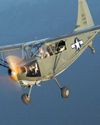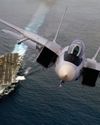The Original "Old Crow"
Flight Journal
|January - February 2023
Col. Bud Anderson's airborne reunion with a P-39Q Airacobra,The evening sun was low on the horizon as John Cyrier taxied toward the Commemorative Air Force's (CAF's) ramp at San Marcos, Texas on July 28. He had just completed the final leg of a four-stop flight home from AirVenture 2022 in Oshkosh, Wisconsin. Cyrier pivoted the Central Texas Wing's P-39Q around to the right, braked to a stop, and cut power to the fighter's Allison V-1710 V-12 engine. Just after its 11-foot, seven-inch Aeroproducts propeller swung to a stop, he shot both arms through the P-39's rolled-down cockpit door windows, clenched his fists, and yelled an exultant "Yeeeaaah!"

Cyrier had just realized a dream three years in the making, reuniting America's highest ranking, living ace, Col. Clarence Bud” Anderson, with a tribute to the airplane he first dubbed Old Crow.”
Before Anderson went to combat in England with the 357th Fighter Group and scored 16.25 kills in Band D-model P-51 Mustangs wearing his famed Old Crow" livery, he flew another fighter—the Bell P-39 Airacobra.

Shortly after earning his U.S. Army Air Force wings and commission in September, 1942, Anderson received orders to the 328th Fighter Group at Hamilton Field near San Francisco to train in the P-39 at Oakland Municipal Airport. After three months, he was chosen to be among a cadre of officers forming a new group for combat, the 357th Fighter Group.
Initially, the Group trained at Tonopah, Nevada, practicing formation flight, gunnery, dive-bombing, and dogfighting, flying as much as 100 hours per month. New pilots, including Chuck Yeager, joined the unit throughout its time at Tonopah.
Anderson was made a flight leader in the 363rd Fighter Squadron, flying Dand later Q-model Airacobras as the Group made its way from Tonopah to bases in Santa Rosa and Oroville, California then Casper, Wyoming before leaving its P-39s behind and sailing for England in November 1943.

Kentucky Straight Bourbon Whiskey
このストーリーは、Flight Journal の January - February 2023 版からのものです。
Magzter GOLD を購読すると、厳選された何千ものプレミアム記事や、10,000 以上の雑誌や新聞にアクセスできます。
すでに購読者ですか? サインイン
Flight Journal からのその他のストーリー

Flight Journal
ELLIPTICAL ELEGANCE
Flying and evaluating the Seafire Mark III
4 mins
November - December 2025

Flight Journal
IRON DOG
Fighting the Pacific and the P-39 at the same time
14 mins
November - December 2025

Flight Journal
Fighter Pilots: A Warrior Clan
TAKE A HARD LOOK at the two young men in these photos. Do they look as if they were bent on killing one another? On the left we have a young, unknown enlisted Japanese pilot standing in front of a Nakajima Ki-27 \"Nate,\" one of Japan's earliest monoplanes that led to the much vaunted Zero.
3 mins
November - December 2025

Flight Journal
KEN WALSH THE FIRST CORSAIR ACE
Medal of Honor pilot's combat adventures
12 mins
November - December 2025

Flight Journal
Big Chief's Little Chief
Thunderbolt action with the Wolf Pack
11 mins
November - December 2025

Flight Journal
ENEMY PILOTS SPEAK Voices from the other side
All too often American students of air warfare forget that enemy aircraftwhether Messerschmitts or MiGs-were flown by human beings with the same motivations and traits as Allied airmen. More often than not, the only difference between friend and foe was the paint on the airplane and where they landed. Therefore, we've assembled a variety of accounts from WW II Axis fighter pilots, men who were more than simply targets.
11 mins
November - December 2025

Flight Journal
FLYING THE FW 190
A legend gets checked out in the Butcher Bird
15 mins
November - December 2025

Flight Journal
DOUBLE-THEATER ACE
The fearless missions of legendary fighter pilot Col. John D. Landers
12 mins
November - December 2025

Flight Journal
WARBUG IN THE PACIFIC
Surviving combat in a Stinson OY-1/L-5
10 mins
September - October 2025

Flight Journal
WINGS OF THE FLEET
Celebrating the U.S. Navy's 250-year legacy
9 mins
September - October 2025
Translate
Change font size

